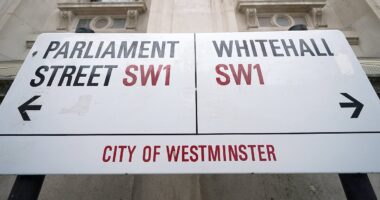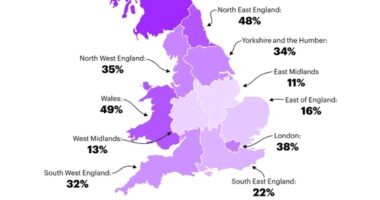A recent study by the Local Government Chronicle (LGC) revealed that less than one-third of senior council figures believe Labour is trustworthy, signaling a decline in optimism towards Sir Keir Starmer’s Government among town halls.
A survey found that only 31 per cent of senior council figures said the Government can be trusted, which was down from 52 per cent last year.
It also showed that little more than a quarter (28 per cent) expected local government to be listened to, down from 55 per cent.
And less than half (43 per cent) expected more power to be devolved to councils, down from 59 per cent.
The survey indicates that the initial enthusiasm for Labour following their victory in last July’s general election has waned, marking the end of their honeymoon period.
The Prime Minister and Chancellor Rachel Reeves have made achieving economic growth their ‘number one priority’ since entering Downing Street.
But less than one-third of respondents to the survey (32 per cent) expected the economy to be stronger in a year’s time.
This was down from 61 per cent in the LGC’s previous survey in September last year.

Less than one-third of senior council figures believe Labour is trustworthy, signaling a decline in optimism towards Sir Keir Starmer’s Government among town halls, according to new research.

Deputy PM Angela Rayner is overseeing a shake-up of local government as she seeks to abolish two-tier council areas

The survey, conducted by the Local Government Chronicle (LGC), suggested that Labour’s honeymoon period since winning last July’s general election is now over
Across all questions relating to confidence in Sir Keir’s Government, the LGC found opinions were consistently and substantially more negative than in September.
One chief executive bemoaned how ‘the much-hoped for revitalisation of public service provision has faded all too soon’.
A director at a district council branded Labour’s approach to local government as ‘disappointing’.
‘Like they see it as a problem that needs to be fixed without actually taking the time to understand what local government actually does or the challenges it faces,’ they added.
A frontline worker at a county council said: ‘The demand is outstretching the funding in many areas.
‘Population growth and growing demand do not seem to be considered. It means cuts to services and increased council tax for residents in order for councils to try and avoid going bankrupt.
‘Residents are being asked to pay more and more and getting worse services / no services in return.’
And a head of service in the North West said: ‘The financial crisis and growth are clearly important, but otherwise they seem to lack a coherent approach and are not encouraging aspiration.’
Deputy PM Angela Rayner is overseeing a shake-up of local government as she seeks to abolish two-tier council areas by merging district councils into larger unitary authorities.
But the survey found opinions on Ms Rayner had become considerably more negative.
Only 35 per cent said they were confident the Deputy PM understands local government, down from 47 per cent.
Less than one-third (30 per cent) said they were confident she is trustworthy, down from 44 per cent.
The same proportion (30 per cent) said they were confident Ms Rayner would champion local government in Whitehall, down from 49 per cent.
And only 27 per cent said they were confident the Deputy PM would engage and consult local government on policy development, down from 48 per cent.
A respondent from the East Midlands said: ‘The Government should be addressing the financial viability of local government before embarking on local authority reorganisation.’
The LGC received just over 300 responses to their online survey between April and May.
Almost a quarter were chief executives, directors or heads of service at councils, while 14 per cent were councillors.
One-fifth were managers, 25 per cent had some other role and 7 per cent described themselves as frontline staff.
Over 70 per cent of respondents were employed by councils and the rest were from central government, combined authorities and the private sector who work closely with local government.
The Ministry of Housing, Communities and Local Government has been contacted for comment.

















